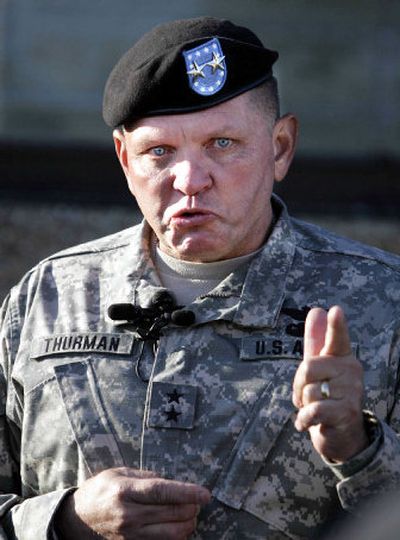U.S. hands over some bases to Iraqis

TIKRIT, Iraq – Seeking to lower the visibility of U.S. troops and grant more authority to Iraqi government forces, the American military has now ceded control of 27 of the nation’s 109 bases, U.S. and Iraqi officials said.
Thousands of U.S. troops have been redeployed in recent months from bases in Najaf, Karbala, Tikrit and other cities, and Iraqis are now in charge of patrol areas that include four districts of Baghdad and the town of Taiji, northeast of the capital.
On Friday, American officials announced that the next major military installation expected to be transferred to Iraqi control was former President Saddam Hussein’s palace complex in Tikrit. The site has been renamed Forward Operating Base Danger and currently houses more than 6,000 U.S. troops.
Iraqi and U.S. officials said they had quickened the pace of such security transfers in recent weeks and planned to formalize what had been an ad hoc, piecemeal approach.
“We’ve already handed over nine different areas north of Baghdad as part of a national plan,” said Robert Holby, a State Department official assigned to Tikrit. “We want to put an Iraqi face on things. Everybody thinks that if we move away from the cities, this will make the violence go down.”
Iraqi and American officials involved in negotiating the hand-overs say they are a first, small step toward the eventual withdrawal of U.S. troops. The current troop level in Iraq – 161,000 – is the highest of the war. The contingent was increased recently to prepare for the Iraqi constitutional referendum that was held this month.
A month ago, generals testified on Capitol Hill that the U.S. military presence may be inflaming Iraq’s insurgency because it fueled the perception of a continuing American occupation. The generals also suggested that troop reductions should be considered to wean Iraqi forces from their dependence on U.S. troops.
In recent interviews, Iraqi leaders said that giving more control to their forces would give U.S. troops more flexibility and Iraqi troops more experience.
“We believe that there are some cities where the coalition does not need to be present and there is a need to reduce the visibility of their presence,” Iraqi national security adviser Mowaffak Rubaie said. “We also want to give the Iraqi security forces the chance to be in charge of all responsibilities as soon as possible.
“This will relieve the coalition forces in quiet areas and make it possible to introduce more of them to the hot spots or even make them available to go home with a big ‘thank you.’ “
Last week, Defense Secretary Donald H. Rumsfeld told a gathering of U.S. troops in Seoul that a substantial reduction in Iraqi military “bases and locations” could be expected, “and from our standpoint, the sooner the better.”
Some critics of the plan to remove U.S. troops from Iraqi cities, however, have questioned whether it will have any positive effect on the violence.
On Monday, insurgents set off three large vehicle bombs targeting the Palestine Hotel in downtown Baghdad, where Iraqi forces had begun to take over operations. The coordinated explosions killed 10 people and highlighted the insurgents’ sophistication.
An American military adviser familiar with the discussions said removing U.S. troops from urban areas would not reduce the intensity of the fighting because the insurgency now primarily targeted Iraqi troops and police.